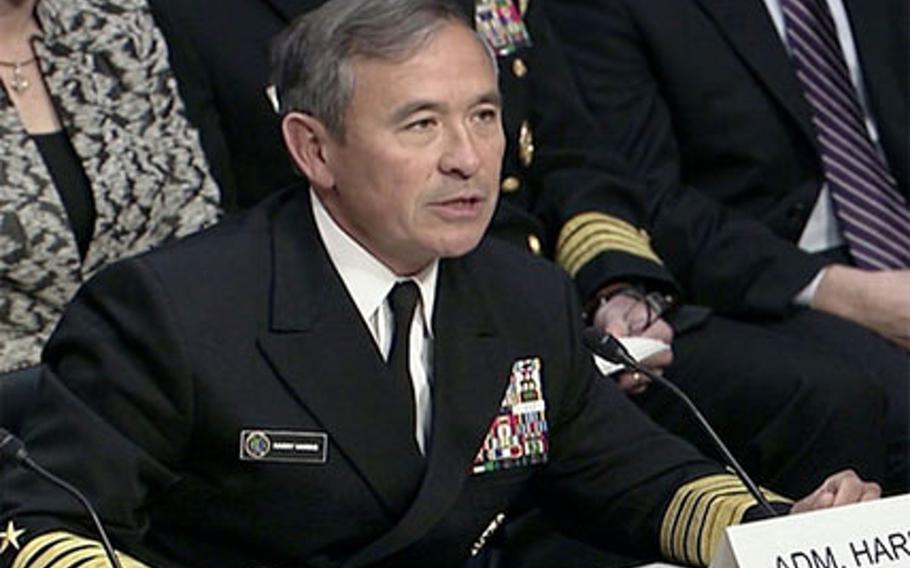
Adm. Harry Harris Jr. (Courtesy Department of Defense)
KUALA LUMPUR, Malaysia — China warned the U.S. on Tuesday that it would defend its newly developed man-made islands in the South China Sea, senior U.S. officials said after a meeting of the countries’ defense ministers.
Defense Secretary Ash Carter and Chinese Defense Minister Gen. Chang Wanquan had a “cordial” meeting, officials said, though both held strongly to opposing positions regarding rights to the waters surrounding controversial islands in the South China Sea.
Chang told Carter that China viewed last week’s patrol by the destroyer USS Lassen within 12 miles of the Subi Reef as illegal, and warned it would do what it thought necessary to protect its sovereign territory. Carter reiterated the U.S. position, that its military would continue to conduct freedom of navigation operations and said the U.S. would “fly, sail and operate” in the South China Sea and elsewhere to guarantee that international waters remain open for all, according to the officials, who had knowledge of the meeting. The Navy is planning to conduct two sails through the South China Sea each quarter; Chang did not ask the U.S. to cease ship movements in the disputed waters, officials said.
Unlike earlier comments by a Chinese admiral that further sails by the U.S. could provoke a war, Chang “did not say anything about war,” said one official who briefed reporters.
Chang mentioned there was “a bottom line” as to what freedom of navigation activities China will tolerate, officials said, but Chang did not elaborate.
Chang repeated the promise made by President Xi Jinping during his visit to the U.S. in September -- that China would halt its militarization of the Spratly Islands. Carter repeated the U.S. position that it does not take sides in the territorial dispute.
Carter accepted Chang’s invitation to visit China this spring
during the 40-minute meeting, which officials said lasted longer than expected. Both men were in Kuala Lumpur for a meeting of the Association of South East Asian Nations.
Earlier Tuesday, the U.S. Pacific Command chief, Adm. Harry Harris, speaking to students at Peking University in Beijing said, “The South China Sea is not — and will not — be an exception” in the U.S. Navy’s regular freedom of navigation exercises.
Following the transit of the Lassen in disputed waters, tensions escalated in the region. China warned against further provocative moves, and a Chinese admiral said that additional U.S. transits could spark war.
“We must not allow the areas where China and the U.S. disagree to impact our ability to make progress on the areas where we do agree,” Harris said.
He stressed that military-to-military relations with China continue, and noted that Chinese navy ships were visiting Mayport, Fla., and that the Chinese hospital ship Peace Ark was visiting San Diego.
“Later this month, not only will USS Stethem visit Shanghai; so too will Adm. Scott Swift, the U.S. Pacific Fleet commander,” Harris said.
“Part of our strategy is to deepen engagement with China at every level so that we can maximize cooperation on areas of mutual interest while confronting and managing our disagreements,” he said.
That approach was evident at the regional level in recent days.
On Sunday, officials from China, Japan and South Korea met in Seoul for their first summit in three years and agreed to restore trilateral relations and work together to get North Korea to return to six-party talks aimed at ending the country’s nuclear program. The U.S. is a part of those talks.
Carter met separately in Seoul with South Korean Defense Minister Han Min-koo. During a joint news conference Monday, Han, when asked about the South China Sea, called for freedom of navigation, and said: “We … have asked to refrain from any action that threatens the peace and stability of this area.”
South Korea’s response reflects its own drive “not to rattle China,” said Bruce Klingner, a senior research fellow on Asia at the Heritage Foundation.
Carter called on all parties to stop dredging and militarization activities, and emphasized the importance of China halting militarization of the islands.
It was unclear whether the issue would be included in a final statement from the ASEAN defense ministers meeting Wednesday. U.S. officials who briefed reporters traveling with Carter said China has leaned on regional partners not to raise the issue at the ASEAN meeting.
China “is incredibly important to them economically and strategically,” a senior U.S. official said on condition of anonymity. “I don’t know where this is going to land.”
copp.tara@stripes.comTwitter: @TaraCopp